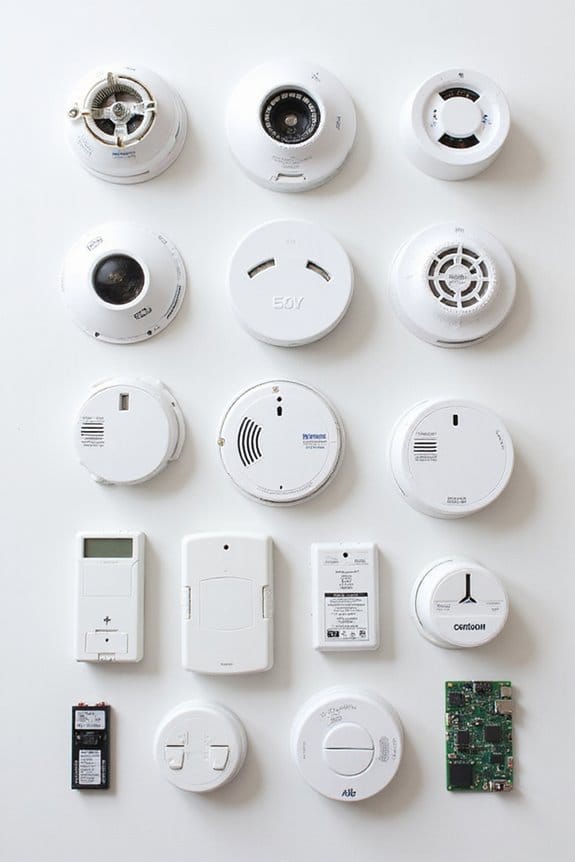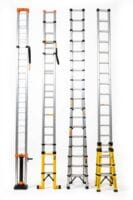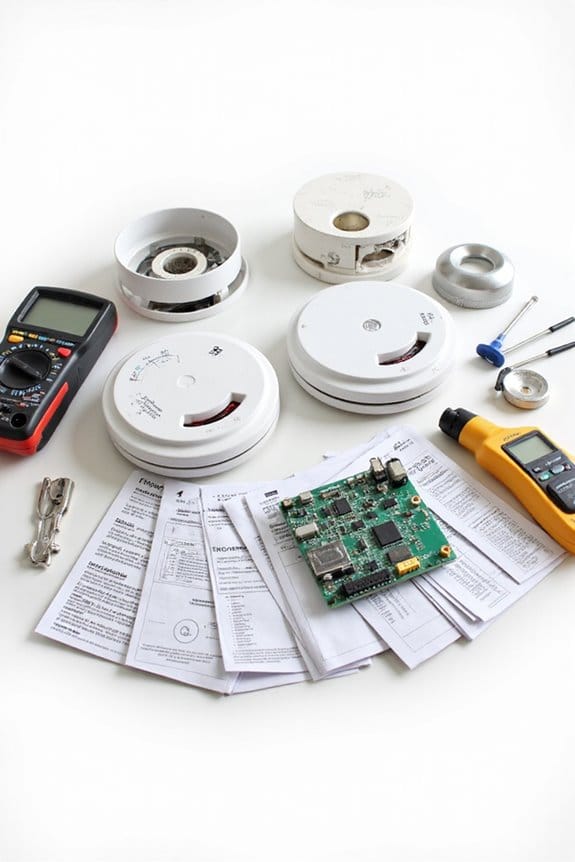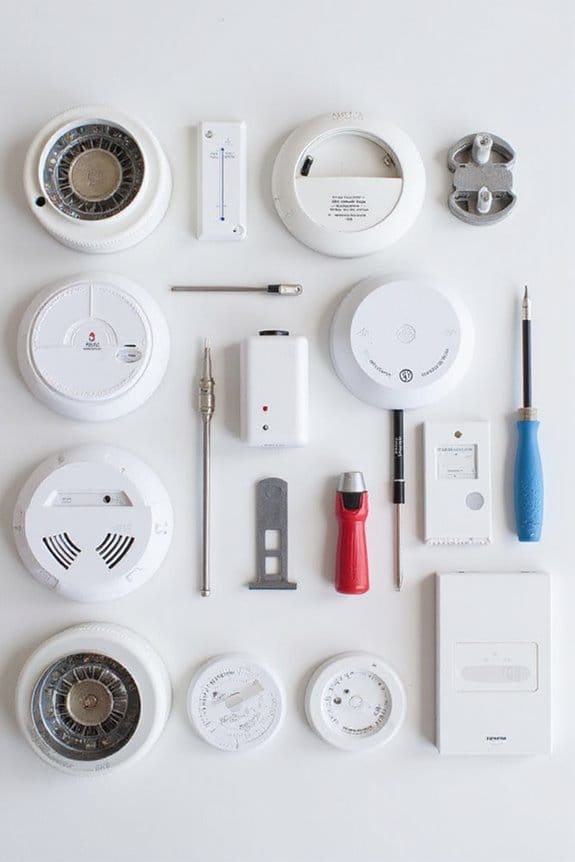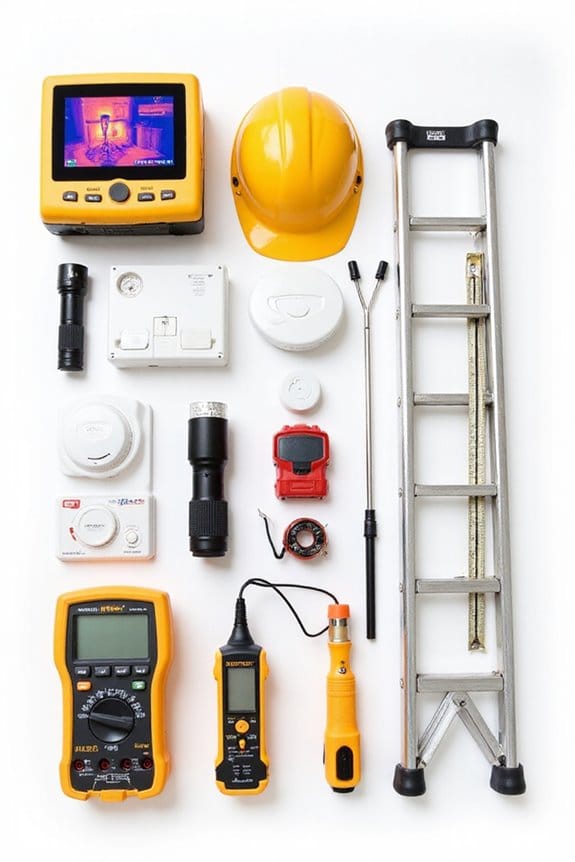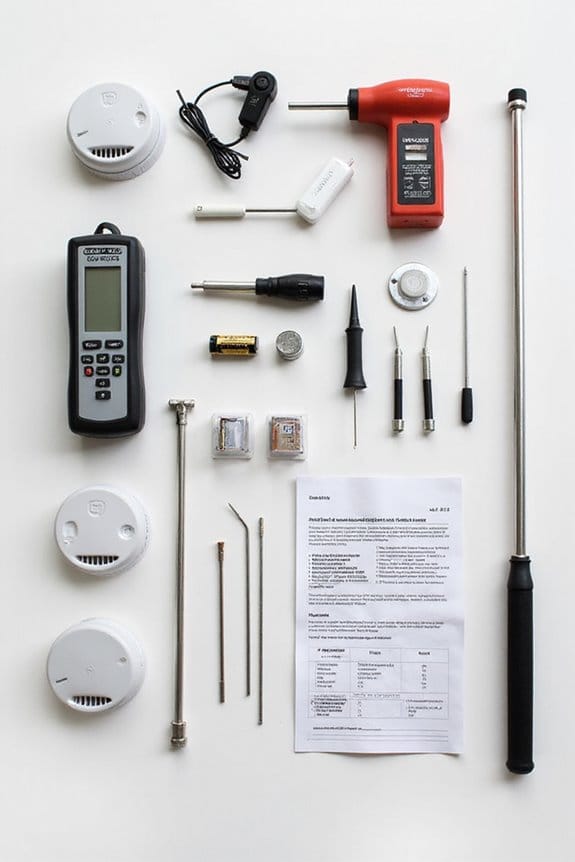When it comes to smoke detectors, there are several types to choose from, each with its own perks. Here’s a quick rundown:
- Photoelectric Detectors: Great for smoldering fires.
- Ionization Detectors: Best for fast, flaming fires.
- Combination Detectors: Handle both smoke and carbon monoxide.
- Intelligent Detectors: Use smart tech to analyze multiple factors.
Each type has its place, and you’ll want the right fit for your needs. Stick around, and you’ll discover even more details!
Key Takeaways
- Photoelectric smoke detectors excel at detecting smoldering fires and reduce false alarms from cooking fumes.
- Ionization smoke detectors are highly responsive to fast, flaming fires, making them suitable for use in kitchens.
- Combination detectors offer both smoke and carbon monoxide detection, along with advanced features like smart technology and long-lasting batteries.
- Intelligent/multicriteria detectors utilize multiple sensor technologies and advanced algorithms to distinguish between different fire types effectively.
- Other fire detection systems include aspirating smoke detection for sensitive areas and addressable systems for large facilities, enhancing safety and response time.
Photoelectric Smoke Detectors
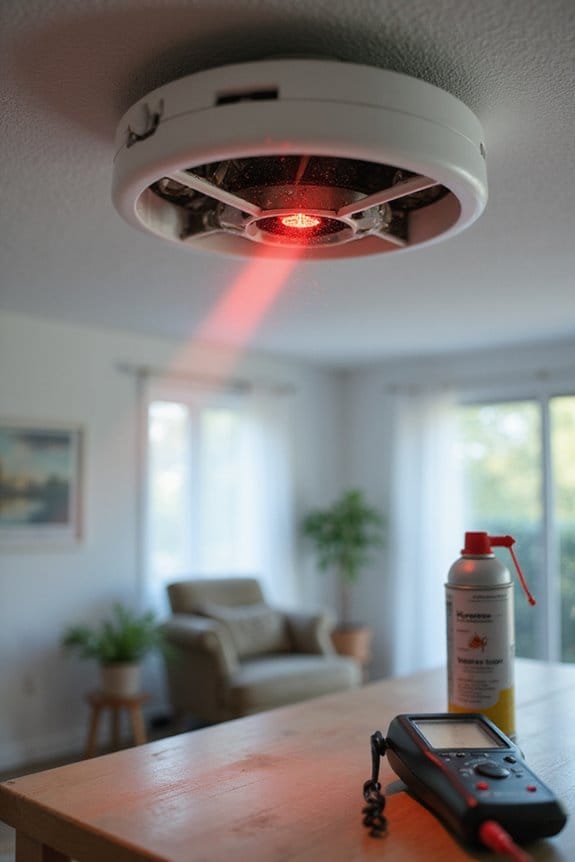
When it comes to smoke detectors, you might be surprised to learn that there are two main types: photoelectric and ionization detectors. Let’s focus on photoelectric detectors, which have some great advantages.
- Smoke Chamber Design: These detectors utilize a non-directional smoke chamber, making them effective at detecting smoke from any angle.
- Sensitivity: They excel in identifying smoldering fires, which can produce lots of smoke without flames—think of that forgotten toast in the toaster!
- Reduced False Alarms: Unlike ionization types, photoelectric detectors are less likely to alarm from cooking fumes or steam. Additionally, many modern detectors incorporate advanced sensing technology to further minimize false alarms and ensure reliable performance.
Ionization Smoke Detectors
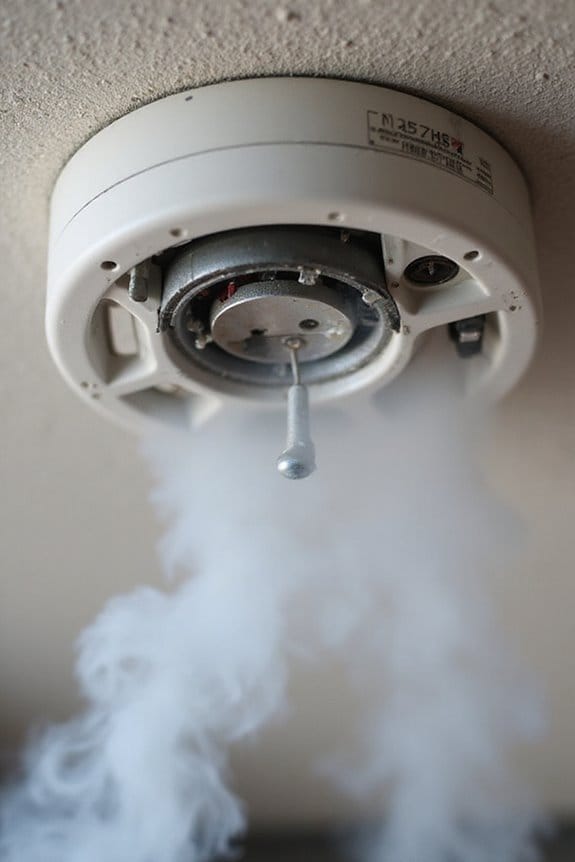
Ionization Smoke Detectors
Ionization smoke detectors are one of the two primary types of smoke alarms, and they pack some unique features that make them especially effective. Here’s what you should know:
- How They Work: Using ionization principles, these detectors contain a small amount of radioactive material that ionizes air. When smoke enters the chamber, it disrupts the current, triggering the alarm.
- Detector Benefits: They’re particularly responsive to fast, flaming fires, making them ideal for kitchens.
- Low Profile: Their compact design allows for easy installation on ceilings or high walls.
- Safety First: Don’t worry! The radioactive source is sealed and poses minimal health risks.
- Response Time: Ionization detectors typically respond faster to flaming fires than photoelectric models, enhancing overall safety in your home.
In short, ionization detectors are a reliable choice for smoke detection, especially in areas prone to quick ignitions.
Combination Detectors
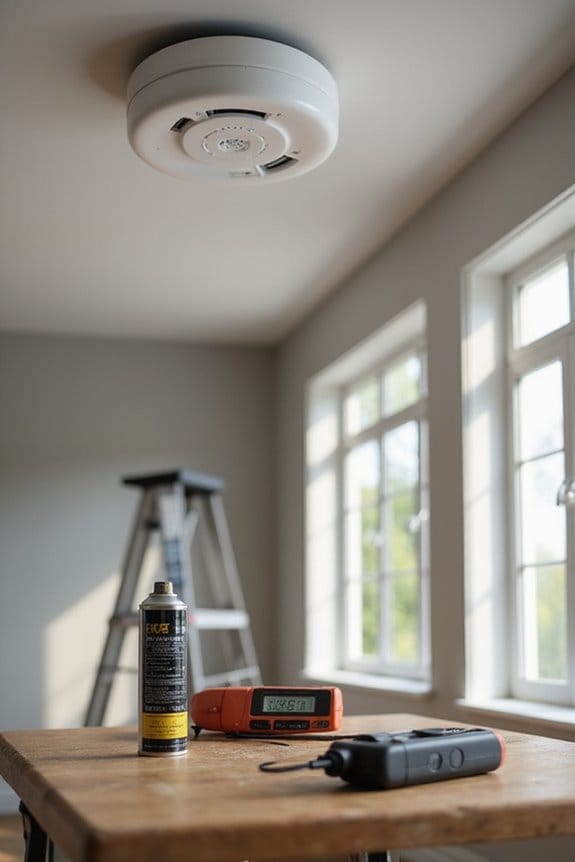
Combination detectors are a fantastic option if you want to cover all your bases when it comes to fire safety. Here are a few types I recommend:
- Ionization and Photoelectric: These detect both smoldering and flaming fires, offering broad-spectrum protection. Alarm activation happens with either sensor.
- Smoke and Carbon Monoxide: They tackle two common hazards, enhancing safety in your home. Some models even provide voice alerts!
- Smoke and Heat: These are great for monitoring significant heat increases, giving you early warnings for various fire scenarios.
- Advanced Features: Look out for smart models with app control and interconnectivity. Additionally, some detectors come with 10-year sealed lithium batteries for long-lasting reliability.
Investing in combination detectors can be a smart, cost-effective way to keep your home safe from multiple hazards.
Intelligent/Multicriteria Detectors
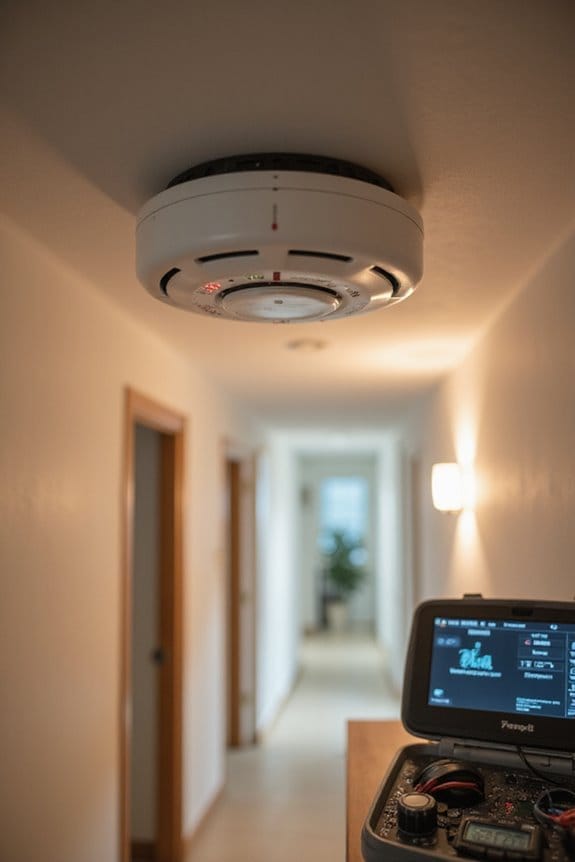
Now that we’ve explored combination detectors, let’s talk about intelligent or multicriteria detectors. These advanced devices combine multiple sensor technologies, like ionization and photoelectric sensors, for broader fire detection capabilities. Here’s what makes them special:
- Advanced Algorithms: They analyze smoke particles, heat, and even CO levels simultaneously to improve accuracy.
- Smart Communication: Using addressable analog technology, they identify and monitor individual detectors in a network.
- Versatile Detection: They distinguish between fast flaming and smoldering fires, reducing false alarms effectively.
With features like real-time mobile alerts and easy maintenance options, intelligent detectors make fire safety a breeze. They’re like the Swiss Army knife of smoke detectors—smart, reliable, and ready to keep you safe! Furthermore, they often incorporate photoelectric technology to enhance detection capabilities and minimize false alarms.
Other Fire Detectors & Professional Use
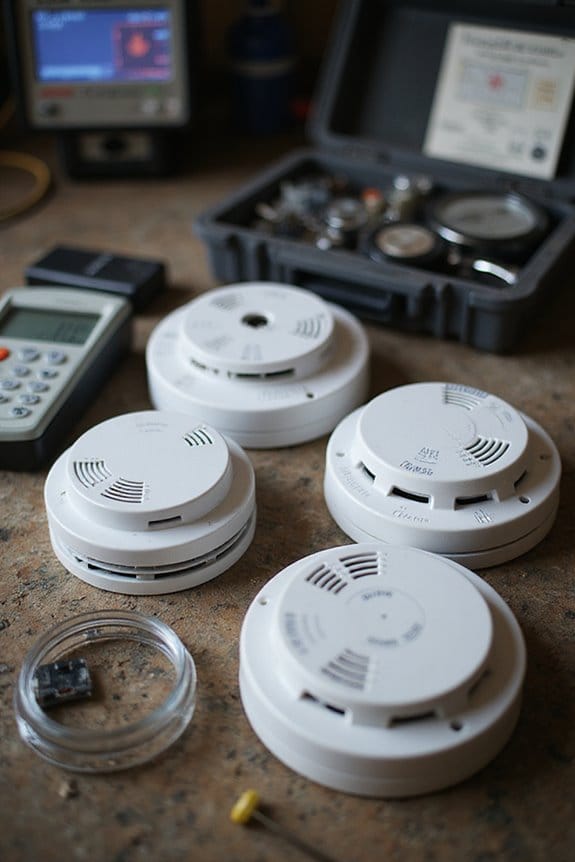
When it comes to fire safety, having the right type of detector can make all the difference. Besides smoke detectors, there are advanced fire safety technologies worth considering:
- Aspirating Smoke Detection (ASD): These systems continuously sample air for smoke particles, providing early warnings in sensitive areas like data centers.
- Addressable Fire Detection Systems: They pinpoint alarm sources in large facilities, cutting down on response time.
- Wireless Fire Detection Systems: Perfect for historic buildings, they use radio signals for flexible installation.
- Hybrid Systems: Combining wired and wireless tech, they adapt well to renovations.
These smoke detection innovations can save lives and property, so it’s essential to choose the right system for your needs!
Frequently Asked Questions
How Often Should Smoke Detectors Be Replaced?
I’ve often wondered about the ideal replacement frequency for smoke alarms. It turns out, every 10 years is essential for ensuring maximum smoke alarm lifespan, even if they seem fine. Trust me, it’s worth the peace of mind!
Can Smoke Detectors Be Interconnected With Other Safety Devices?
Absolutely, I’ve learned that smoke detectors can be part of interconnected systems, enhancing safety integration. They connect with alarms, heat detectors, and more, ensuring everyone’s alerted quickly in case of a fire, boosting overall safety.
What Is the Lifespan of a Typical Smoke Detector?
Like a clock ticking down, smoke detector lifespan usually ranges from 8 to 10 years. I can’t stress enough, aging smoke detectors need replacing to guarantee your safety—check the manufacture date inside your unit!
Are There Specific Maintenance Tips for Smoke Detectors?
When it comes to smoke detector maintenance, I always test mine monthly and clean them regularly. Keeping up with these maintenance frequencies guarantees they’re working well and reduces the chances of false alarms.
Do Smoke Detectors Need to Be Installed in Every Room?
Imagine a lighthouse guiding ships home; smoke detectors serve a similar purpose. I believe every room needs them for safety regulations. Proper placement guarantees quick alerts, giving us precious time to escape danger.

